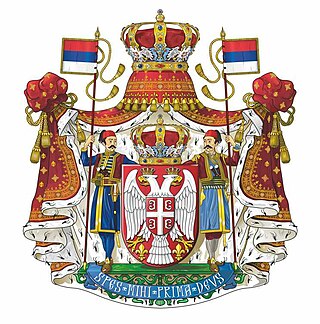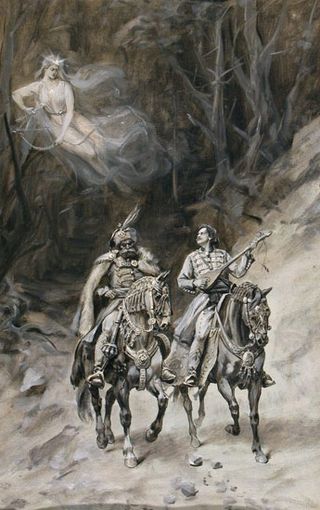
The House of Karađorđević or Karađorđević dynasty is the name of the former ruling Serbian and deposed Yugoslav royal family.

Serbo-Croatian – also called Serbo-Croat, Serbo-Croat-Bosnian (SCB), Bosnian-Croatian-Serbian (BCS), and Bosnian-Croatian-Montenegrin-Serbian (BCMS) – is a South Slavic language and the primary language of Serbia, Croatia, Bosnia and Herzegovina, and Montenegro. It is a pluricentric language with four mutually intelligible standard varieties, namely Serbian, Croatian, Bosnian, and Montenegrin.

Serbian is the standardized variety of the Serbo-Croatian language mainly used by Serbs. It is the official and national language of Serbia, one of the three official languages of Bosnia and Herzegovina and co-official in Montenegro and Kosovo. It is a recognized minority language in Croatia, North Macedonia, Romania, Hungary, Slovakia, and the Czech Republic.

Đorđe Petrović, known by the sobriquet Karađorđe, was a Serbian revolutionary leader who led a struggle against the Ottoman Empire during the First Serbian Uprising. He held the title of Grand Vožd of Serbia from 14 February 1804 to 3 October 1813.
Krajina is a Slavic toponym, meaning 'country' or 'march'. The term is related to kraj or krai, originally meanings land, country or edge and today denoting a region or province, usually remote from urban centers.

Knyaz, also knez, knjaz or kniaz, is a historical Slavic title, used both as a royal and noble title in different times. It is usually translated into English as "prince", "king", or "duke" depending on specific historical context and the potentially known Latin equivalents at the time, but the word was originally derived from the common Germanic *kuningaz (king).

The South Slavic languages are one of three branches of the Slavic languages. There are approximately 30 million speakers, mainly in the Balkans. These are separated geographically from speakers of the other two Slavic branches by a belt of German, Hungarian and Romanian speakers.

Shtokavian or Štokavian is the prestige supradialect of the pluricentric Serbo-Croatian language and the basis of its Serbian, Croatian, Bosnian and Montenegrin standards. It is a part of the South Slavic dialect continuum. Its name comes from the form for the interrogative pronoun for "what" što. This is in contrast to Kajkavian and Chakavian.

A vila, or víla is a Slavic fairy similar to a nymph.
Petrović is a South Slavic language patronymic surname literally meaning Peter's son, equivalent to the English last name of Peterson. In Eastern Slavic naming customs its counterpart is "Petrovich".
Dalibor Brozović was a Croatian linguist, Slavist, dialectologist and politician. He studied the history of standard languages in the Slavic region, especially Croatian. He was an active Esperantist since 1946, and wrote Esperanto poetry as well as translated works into the language.

The Serbo-Croatian Wikipedia is the Serbo-Croatian language version of Wikipedia, the free encyclopedia. It was started on 16 January 2002, preceding Wikipedia versions in the different standardised varieties of the language, namely Bosnian, Croatian, and Serbian. It is written in the Latin script with a converter to Cyrillic. It currently has 265 active users, 8 administrators, and 460,131 articles, comprising a total of 42.2 million edits.

The Life and Deeds of the Immortal Leader Karađorđe, or simply Karađorđe, is a 1911 Serbian silent film directed by Ilija Stanojević and starring Milorad Petrović. It was the first feature film released in Serbia and the Balkans. Petrović portrays the eponymous rebel leader Karađorđe, who led the First Serbian Uprising of 1804–1813.

The Serbian Revolution was a national uprising and constitutional change in Serbia that took place between 1804 and 1835, during which this territory evolved from an Ottoman province into a rebel territory, a constitutional monarchy, and modern Serbia.

The Battle of Deligrad was fought between Serbian revolutionaries and an army of the Ottoman Empire, and took place in 3 September 1806 during the First Serbian Uprising. A 55,000-strong Ottoman army commanded by Albanian Pasha of Scutari Ibrahim Pasha was defeated with heavy casualties and the loss of nine guns by Karađorđe Petrović's 30,000 Serbian rebels at Deligrad in Serbia.
Serbo-Croatian, Croato-Serbian, Serbo-Croat or Croato-Serb, refers to a South Slavic language that is the primary language of Serbia, Croatia, Bosnia and Herzegovina, and Montenegro, as well as a minority language in Kosovo.

The siege of Belgrade was carried out by the Serbian rebels led by Karađorđe, seeking to overthrow the Ottoman government in the Sanjak of Smederevo, which was seated in the Belgrade Fortress. Following the victories at Mišar and Deligrad, the Serbian rebels marched towards Belgrade.

Branko Tošović is an Austrian and Serbian philologist, linguist and literary scholar.

Petar Jokić also known as Topolac, was one of the important participants in the First Serbian Uprising, also credited for collecting material for the history of the turbulent time in which he lived. As an insurgent, he is known mainly to historians, while with the interesting data he provided to historiography, he became known to a wider readership. It was historian Milan Milićević who recorded Petar Jokić's experiences during the First Serbian Uprising on behalf of the Serbian Royal Academy of Sciences before he died. According to the decision of the censor, his testimony could not appear in print during the reign of Prince Aleksandar Karađorđević, but much later, only in 1891. There were two other revolutionaries, Janićije Đurić and Anta Protić, who also wrote their eyewitness accounts about the war of independence.

Janićije Dimitrijević Đurić, also spelled Janićije Djurić, was the secretary of Karađorđe Petrović, a member of the Governing State Council and the president of the Court of Appeals.














